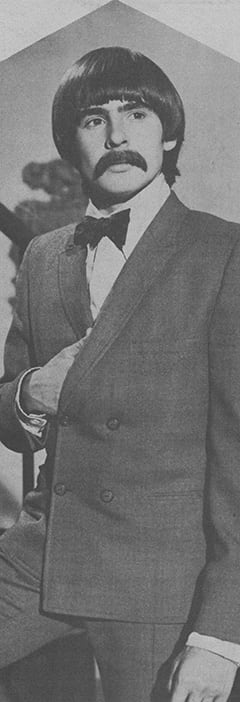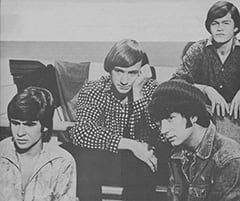
Davy Jones—the little Monkee with a big heart—arrived in London via Nassau, wearing a battered black top hat purchased from a hotel doorman, and accompanied by his friend Stephen Pearl, who was once a journalist and is now a karate expert “for the use of!”
Davy is the Monkees’ front-man, diplomat, humorist and honorary press relations officer for the group—a kind of mini-McCartney to Nesmith’s long-legged Lennon.
He prefaced most of his remarks like, “They tell me I should be a millionaire by Christmas” with “And here’s something else you can’t print” when I found him besieged by three hundred screaming girls outside the Grosvenor House hotel, and surrounded by BBC camera crews, pirate radio people, publicists and photographers inside.
Davy was reading a national newspaper report where he was alleged to have said: “Dad used to call me a cheeky monkey and now I am one.” He looked pained!
“I’m sure I never said that!” he said, shaking his head. But he now accepts the fact that the Monkees have reached that unenviable position where quotes can be invented for them, and commercial enterprises present them with gifts.
“Like the Honda motorbike I’ve got. I’ve just had it modified to the tune of $1,000 and now they want it back,” said Davy ruefully. Then he smiled: “Which is cool with me because Triumph wants to give me one anyway!”
Monkee Jones is a good-hearted character. He gets his biggest kicks being able to look after his father financially and help those friends who knew him before his success.
He took the younger members of the Monkees’ studio staff up to San Francisco recently to see the Monkee concert and maintains that there are a lot of other people he wants to take care of when the big money begins to come rolling in.
“So far we haven’t really seen a penny of it,” admitted Davy.

“A great deal of money has to be deferred over several years because of taxes, and things like record royalties just take time. The only one of us who has really had any big money is Micky, who got a fat cheque when he was twenty-one for “Circus Boy,” under that child-actor’s law which holds so much money in trust until you are of age.”
Gradually the day’s Press was melting away and Davy left the room to locate Micky—“he’s got about five hundred girls in his room!” and added consolingly: “I’ll be about three hours!”
In fact, he made the return trip in under twenty minutes, to find we were down to a small nucleus in the lounge. This comprised Monkee-men Hugh Alexander from International Artists, and music publisher Cyril Black, from the ever-present, ever-watchful Screen Gems; Marion Rainsford, the Monkees’ lady publicist via RCA Victor (who is much too nice to have to be nasty to all those fake Paul McCartneys ringing up for Davy), and an affable American photographer with a shiny head and the splendid name of Bob Custer. Not exactly intimate, perhaps, but Davy is a far-from-inhibited conversationalist. He answered my questions with much zest.
Firstly, we dealt with the subject which most people appear to be ducking—the resentment felt very strongly in show business quarters that the Monkees are really non-playing puppets and have no right to their success as a pop group. (Before I get swamped with letters, may I say that the Monkees, in my opinion, are “what’s next” and I go happily around with the wheel.)
“I can only speak for myself,” said Davy. “I am an actor and I have never pretended to be anything else—the public has made me into a rock and roll singer. No one is trying to fool anyone!
“People have tried to put us down by saying we copy the Beatles. So all right; maybe ‘The Monkees’ is a half-hour ‘Hard Day’s Night’. But now we read that the Who are working on a TV series around a group. Now who’s copying who?
“In our show we all play ourselves, with the exception of Peter Tork, who plays a ‘thick’ and he’s not. Pete doesn’t really dig the teeny-boppers scene. Some fans wrote to him that they were watching his house through high-powered binoculars and now he has the curtains drawn all day!
“There are thirty-two Monkee programmes now completed and in about two programmes’ time you should notice about 180 per cent improvement. We really began to get on top of it—ad-libbing and taking the script from the top.
“Originally, the show took five days to film. Now we’ve got it down to two-and-a-half. But people still have no idea how hard we work or they’d never put us down.”
There has also been considerable speculation over how much the Monkees are masters of their own destinies. How much say does the group have? Or are they completely controlled by management? Davy side-stepped this one and, bearing in mind our company, it was forgivable.
“Look,” he went on, “we’re just out to make people happy and enjoy ourselves at the same time!”

